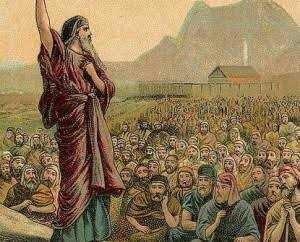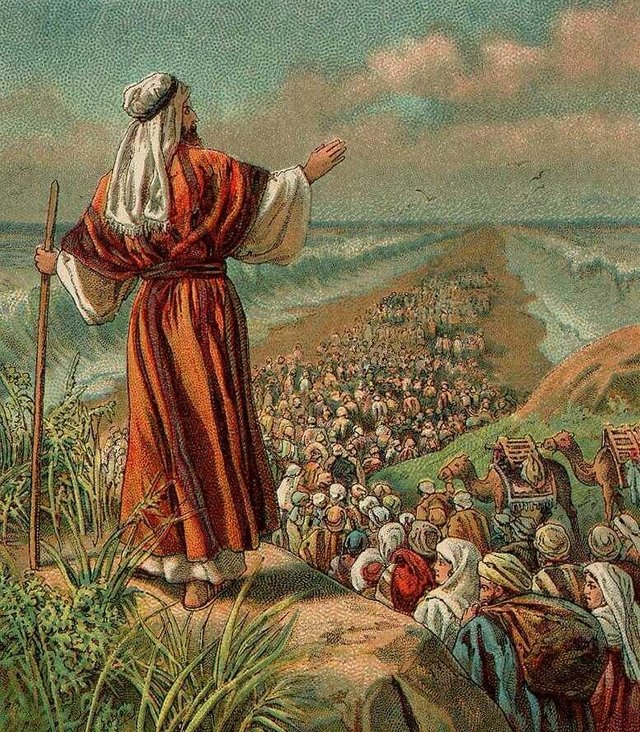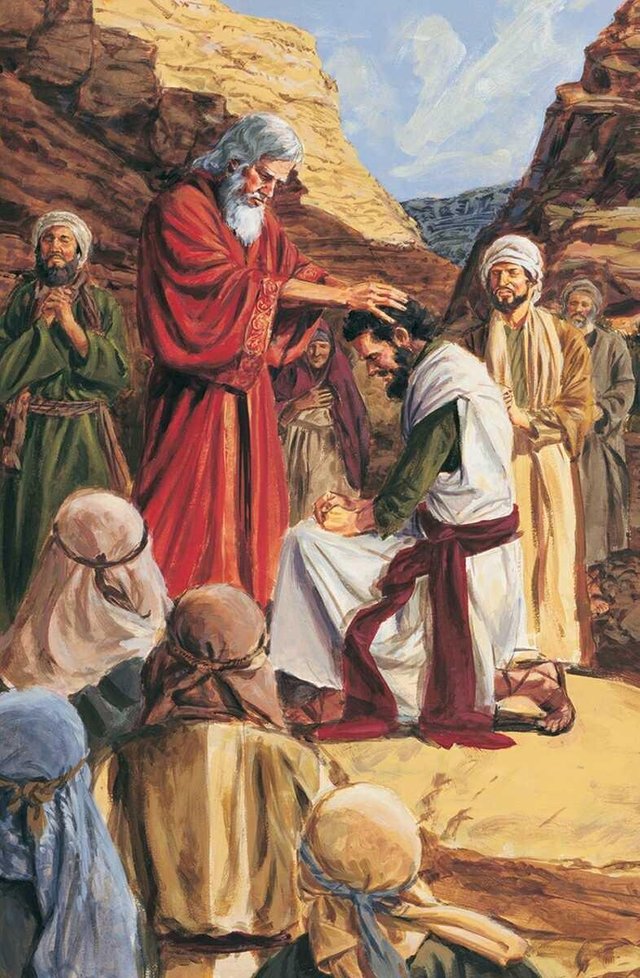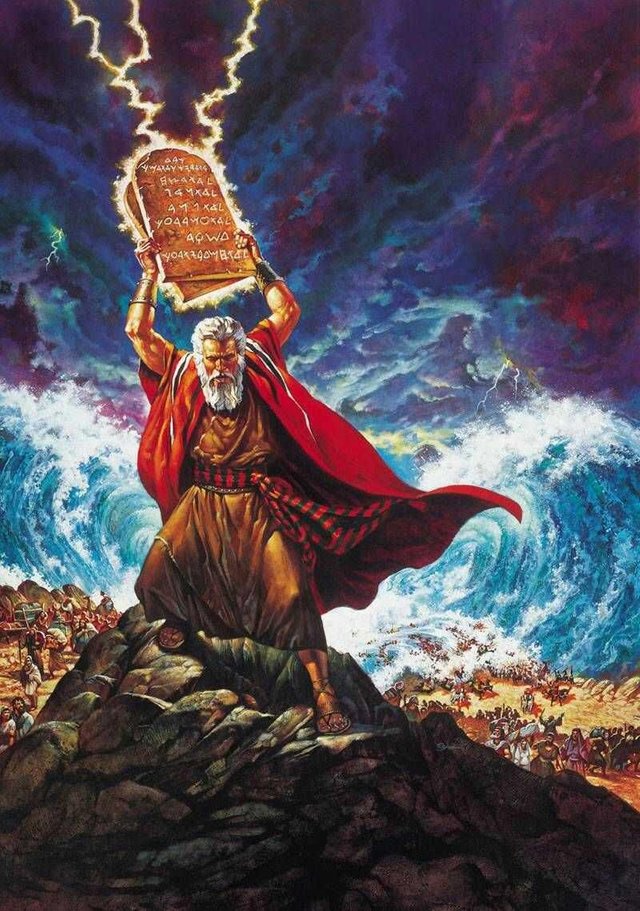MOSES, NUMBER ONE LEADER OF THE WORLD SHOW YOUR LOVE AND UPVOTE FOR MOSES
Moses, a Hebrew prophet, teacher, and leader, delivered his people from Egyptian slavery and founded the religious community known as Israel, based on a covenant relationship with God.

As the vehicle and interpreter of the Covenant, including the Ten Commandments, he exerted a lasting infl uence on the religious life, moral concerns, and social ethics of Western civilization. According to the biblical account in Exodus and Numbers, Moses—whose Hebrew name is Moshe—was a Hebrew foundling adopted and reared in the Egyptian court. Raised there, according to the biblical account, by his biological mother, who was hired to be his nanny, Moses came to know of his Hebrew lineage. As an adult, while on an inspection tour, Moses killed an Egyptian taskmaster who was beating a Hebrew slave. Fearing the wrath of the pharaoh, Moses fl ed to Midian (mostly in northwest Arabia), where he became a shepherd and eventually the son-in-law of a Midianite priest, Jethro. While tending his fl ocks, he saw a burning bush that remained unconsumed by the f l ames and heard a call from the God—thereafter called Yahweh—of Abraham, Isaac, and Jacob to free his people, the Hebrews, from their bondage in Egypt. Because Moses was a stammerer, his brother Aaron was to be his spokesman, but Moses would be Yahweh’s representative. Ramses II, who reigned 1279–13 BCE , was probably the pharaoh of Egypt at the time. He rejected the demand of this unknown God and responded by increasing the oppression of the Hebrews.
 The biblical text states that Moses used plagues sent by Yahweh to bend Ramses’ will. Whether the Hebrews were fi nally permitted to leave Egypt or simply fl ed is not clear. According to the biblical account, the pharaoh’s forces pursued them eastward to the Sea of Reeds, a papyrus lake (not the Red Sea), which the Hebrews crossed safely but in which the Egyptians were engulfed. Moses then led the people to Mount Sinai (Horeb), which lies at the southern tip of the Sinai Peninsula. Yahweh appeared to Moses there in a terrific storm, out of which came the Covenant between Yahweh and the people of Israel, which included the Ten Commandments. Moses began issuing ordinances for specific situations and instituted a system of judges and hearings of civil cases. After leaving Mount Sinai and continuing the journey toward Canaan, Moses faced increasing resistance and frustration from the Hebrew people and once got so angry at them that, according to tradition, Yahweh accounted it as a lack of faith and denied him entrance into Canaan. As his last official act, Moses renewed the Sinai Covenant with the survivors of the wanderings and then climbed Mount Pisgah to look over the land that he could not enter. The Hebrews never saw him again, and the circumstances of his death and burial remain shrouded in mystery.
The biblical text states that Moses used plagues sent by Yahweh to bend Ramses’ will. Whether the Hebrews were fi nally permitted to leave Egypt or simply fl ed is not clear. According to the biblical account, the pharaoh’s forces pursued them eastward to the Sea of Reeds, a papyrus lake (not the Red Sea), which the Hebrews crossed safely but in which the Egyptians were engulfed. Moses then led the people to Mount Sinai (Horeb), which lies at the southern tip of the Sinai Peninsula. Yahweh appeared to Moses there in a terrific storm, out of which came the Covenant between Yahweh and the people of Israel, which included the Ten Commandments. Moses began issuing ordinances for specific situations and instituted a system of judges and hearings of civil cases. After leaving Mount Sinai and continuing the journey toward Canaan, Moses faced increasing resistance and frustration from the Hebrew people and once got so angry at them that, according to tradition, Yahweh accounted it as a lack of faith and denied him entrance into Canaan. As his last official act, Moses renewed the Sinai Covenant with the survivors of the wanderings and then climbed Mount Pisgah to look over the land that he could not enter. The Hebrews never saw him again, and the circumstances of his death and burial remain shrouded in mystery.
 Tradition states that Moses wrote the whole Pentateuch, but this is untenable. Moses did formulate the Decalogue, mediate the Covenant, and begin the process of rendering and codifying interpretations of the Covenant’s stipulations. In a general sense, therefore, the first five books of the Hebrew Bible can be described as Mosaic. Without him there would have been no Israel and no collection known as the Torah.
Tradition states that Moses wrote the whole Pentateuch, but this is untenable. Moses did formulate the Decalogue, mediate the Covenant, and begin the process of rendering and codifying interpretations of the Covenant’s stipulations. In a general sense, therefore, the first five books of the Hebrew Bible can be described as Mosaic. Without him there would have been no Israel and no collection known as the Torah.
The kind of leadership that Moses was exercising makes an impact but not a maximum one. This brand of leader is so busy tackling the urgent they have no time for the important. They don't delegate and so they become the bottleneck for getting anything done. The result is exhaustion. Not only are the people tired, the leaders are tired too.
So Moses went out to meet his father-in-law. He bowed low and kissed him. They asked about each other’s welfare and then went into Moses’ tent. Moses told his father-in-law everything the Lord had done to Pharaoh and Egypt on behalf of Israel. He also told about all the hardships they had experienced along the way and how the Lord had rescued his people from all their troubles. Jethro was delighted when he heard about all the good things the Lord had done for Israel as he rescued them from the hand of the Egyptians.
“Praise the Lord,” Jethro said, “for he has rescued you from the Egyptians and from Pharaoh. Yes, he has rescued Israel from the powerful hand of Egypt!
What made Moses a great leader?
"And there arose not a prophet since in Israel like unto Moses, whom the LORD knew face to face, 11 In all the signs and the wonders, which the LORD sent him to do in the land of Egypt to Pharaoh, and to all his servants, and to all his land, 12 And in all that mighty hand, and in all the great terror which Moses shewed in the sight of all Israel" (Deut. 34:10).
What made Moses such a great prophet and leader to the nation of Israel?
The passage above holds the key. The statement "And there arose not a prophet since in Israel like unto Moses," is followed by, "whom the Lord knew face to face." The key to Moses' greatness was that the God of Heaven and earth knew him face to face.
What does that mean?
Moses had an intimate relationship with God. In fact we read in Exodus 33:11, "And the LORD spake unto Moses face to face, as a man speaketh unto his friend." God spoke to Moses and Moses spoke to God.
During these face to face encounters with God, Moses was given revelation from God for his life and for those he was put in charge to lead. As Moses received God's revealtions he surrendered his life to God's will and led the people of God to do the same. I've heard chrisitans say, "I just don't feel that close to God and I don't experience him speaking to my heart." Perhaps the reason that some don't encounter God in this way is that they don't take the time to pursue in intimate relationship with God and to listen to God. It could also be that God has spoken into their lives and revealed his will to them but they refused to obey Him. The author of Hebrews wrote, "While it is said, To day if ye will hear his voice, harden not your hearts..." (Heb. 3:15). Are you pursuing an intimate relationship with God and surrendering your life to his will? "The world will not be changed by the abundance of our information but by the overflow of our intimacy." Seek the face of God and obey Him.

Source
Plagiarism is the copying & pasting of others work without giving credit to the original author or artist. Plagiarized posts are considered spam.
Spam is discouraged by the community, and may result in action from the cheetah bot.
More information and tips on sharing content.
If you believe this comment is in error, please contact us in #disputes on Discord